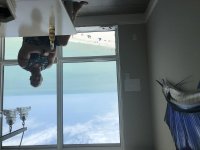Love my collection of Smiths and this new hobby of mine.
I’m not a hunter, but ....
After reading through this entire fascinating discussion twice, I looked up some statistics for reference:
Population of the continent of Africa in 1950:
227-million (100-million less than the current population of the USA).
Population of the continent of Africa today:
1.495-billion - that's BILLION with a B.
That's one point two BILLION more human beings in Africa than there were in 1950, which is roughly the date that "Big Game Hunting" in the traditional "Teddy Roosevelt on Safari" or "man-against-nature" sense began to decline.
As if that number weren't sufficiently frightening, the UN estimates that by 2050, a scant 25 years from now, the African population will exceed TWO point five billion. That's a BILLION more people in the next two decades.
I agree with many of the posts in this discussion which note that without high-cost safari hunts, there would likely be no large game animals, or any animals, left on the African continent.
But even when protected as a revenue-generating asset, how do any animals have a chance at surviving in the wild when the human population has increased by over 500%, or by over a BILLION people, since 1950 when actor Stewart Granger shouldered a Rigby .577 Nitro Express to bring down an elephant while on location filming "King Solomon's Mines?" How can wildlife have a chance when the human population continues to explode at a rate that is literally too much for the human mind to fully comprehend?
Further, estimates suggest that at present, nearly 500-million people in Africa, one-third of the population, live in extreme poverty. Not mere "poverty," but "extreme poverty." In some African countries, like The Central Africa Republic, 70% of the population lives in poverty. Protecting wildlife and wild spaces is hardly at the top of the priority list for those people.
No wonder the animals are disappearing.
It would take a lot of well-heeled hunters to make any appreciable impact on poverty of that scale. Factor in the violence, crime, and corruption --

. I wasn't expecting to come away from reading this discussion feeling hopelessly depressed, but it's hard not to.
And don't get me wrong. I'm not saying "we" (forum members, westerners, whoever "we" reading and posting to this discussion may be) are responsible for Africa's problems, nor should we be made to feel as though we are. The people there can't feed themselves, yet the population of Africa has increased five-fold in the lifetimes of some of us, four-fold in the lifetimes of most of us. "We should do something" is NOT what I'm saying at all.
What I'm trying, and probably failing, to express is: even though I have not hunted in Africa, I understand the appreciation and gratitude those of you who have hunted in Africa have for those experiences. You participated in what was literally the twilight of an era that will likely soon be all but gone. Those of you planning trips in the near future: I wish you well, and I hope you savor every moment of the experience. Please share your adventures with us upon your return.
And I guess... I guess I wish we were living in an earlier age when game was plentiful and there was no indication that humans over the course of a few decades could completely change the face of the untamed landscape or drive incalculably vast herds of wildlife in to oblivion.
Personally, I feel no particular need nor any desire to hunt a large African game animal (except perhaps with a camera - isn't that what a lot of non-hunters say... while being protected by guides with rifles), but I understand the allure, the sense of adventure, and the mystique.
And I totally get the appeal of the Big Game guns... to the point where my first rifle I ever purchased, a mere four years ago, was an "elephant rifle": a Winchester Model 70 Safari Express in .375 H & H magnum.
(Okay, technically more of a Cape Buffalo rifle than an elephant rifle, but close enough.)
Why? It was "the dark times," as you may recall. It seemed the world was shutting down. There was a lot of talk about various grim scenarios in the news. I got to thinking: I've never owned a firearm. Other than cap guns and BB guns I'd only fired a "real" firearm once, a .22 rifle that my dad and uncle let me shoot once, only once, at a paper cup on a fence post. I missed, of course -- I was only 9 years old and had never even held a .22 before. They laughed at me and that was that.
I started thinking about that: about never owning a firearm, about knowing very little about firearms, about feeling humiliated the one time I'd handled a rifle, and one day I decided, what the hey, I'm going to buy a rifle. Not just any rifle. An elephant gun.
I did a lot of reading, and decided on the Model 70 because in .375 H & H it was a "historic" African safari caliber, and the "safari express" model styling is not far removed from turn-of-the-century bolt-action rifles, and yeah, the whole Teddy Roosevelt, Tarzan, King Solomon's Mines, and Ernest Hemingway vibe. Plus, the Model 70 was available and reasonably affordable.
So for me, it's the mystique and the sense of history from the "golden age" of African hunting that makes the "concept" of big game hunting emotionally appealing.
Oh, and - the .375 shoots like a dream and no, it did not knock me flat on my backside even though my only previous rifle experience was one shot with a .22 more decades ago than I care to count.
In keeping with turn of the century tradition and style, a revolver followed shortly, a Model 10. I've since added two more S & W revolvers... which has led to my becoming a member of this forum.
(So, as an aside to the Original Poster: get yourself an elephant rifle! It doesn't have to be about the elephants; it's about the aura, the history, the mystery, and the "cha-chink... BOOM!" of a classic bolt-action big bore rifle.)
, I don't see substantive differences between vegetation and animal life. We're all compelled to grow, reproduce, and handle problems. You'll have to watch the series to see what I mean. I can't recommend it highly enough for those interested. I'm sure it's streaming, somewhere. I bet they wanted to call it the Secret Life of Plants, but there was a popular book in 1973 with that name.




